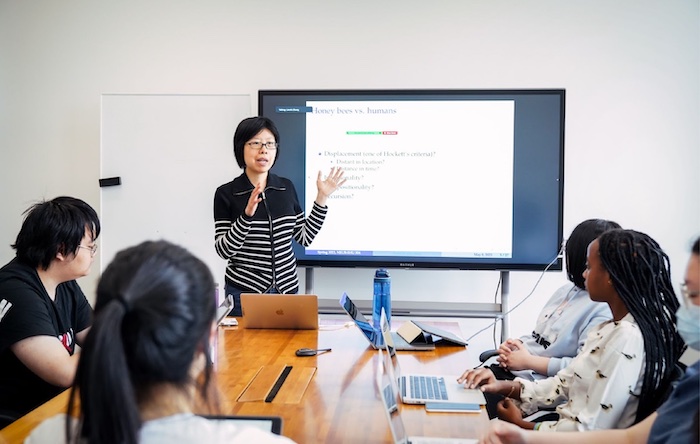
Language is intuitive. Native speakers of a language rarely think about sentence structure, word order, or grammar. But that’s exactly what NYU Shanghai Undergraduate Coordinator of Neuroscience and Assistant Professor of Practice in Neuroscience Linmin Zhang thinks about. At NYU Shanghai, she teaches a seminar on natural language meaning and an introduction to linguistics and neurolinguistics. Teaching native speakers of Chinese, English, Russian, Spanish, Mongolian, French, German, Korean, and Japanese, and Shanghainese–to name a few–makes NYU Shanghai an ideal linguistic laboratory. Zhang sat down to talk with us about her research and how linguistics can help us see language and human cognition in a new light.
Why is your area of expertise important?
I study natural language semantics, which is the meaning behind languages. Research in this field allows us to have a better understanding of human behavior and human inference patterns which further guides us to study the meaning processing system in the brain.
Can you give an example of the type of linguistic puzzle that you tackle?
Sometimes abstract words can change the meaning of a sentence. For example: “Mary came” versus “Even Mary came.” ‘Even’ is often associated with some kind of unlikelihood. So it's kind of beyond the meaning of the sentence itself. Maybe Mary's coming is less likely than other people's coming. We see this used sometimes to address that the popularity/attractiveness of this event is far beyond the usual expectation. Therefore the semantic contribution of “even” is not about the truth of “Mary came,” but rather about how we put this sentence along with other sentences to understand something. It's so intuitive. But people don’t pay attention to their intuitions, just like we do not pay explicit attention to the movement of bones and muscles when we walk.
Another word is ‘again.’ For example, “What’s your name again?” Does that mean that you have changed your name? Does it mean that you have a new name? With “again” attached to this sentence, you’re conveying the meaning that I'm asking the question “what’s your name” again. It doesn't involve a new name. It's really interesting. But people don’t pay explicit attention to their intuitions.

Zhang teaching her class “Meaning” last semester.
How did you develop an interest in linguistics?
Years ago, I was discussing with fellow linguists what led us to the field. We found that three things we were all interested in since childhood were learning foreign languages, mathematics, and playing chess! The underlying commonality between these things is an interest in patterns and trying to figure out why patterns are the way they are.
The study of linguistics is based on human intuition, which is very sharp. Because native speakers of a language share the same cognitive intuition, when they hear a sentence they process it and understand it the same way. It's very empirical, and at the same time it can be very precise. Can we precisely characterize sentence meanings in mathematical language? Working on empirical phenomena with the use of precise, mathematical tools is exactly what I want to do.
Before you started as an assistant professor last year, you were a post-doc at NYU Shanghai. How was that experience?
It was great. I got my own funding from a young scholar talent program at the beginning of 2019, and started my own research projects and teaching. As a post-doc, I developed three new courses (including "Introduction to Linguistics", an STS core curriculum course), published several journal papers (including one at Journal of Semantics, one of the most prestigious journals in formal semantics) and presented at many top-level conferences. Professor Xing Tian was my advisor, and I feel really thankful for his help and support. We explored together some new directions in investigating the semantic representation in the brain, and he was also very supportive of my own independent research projects.
What projects do you have in the works?
I’m interested in seeing if within human cognition, there is some general cognition that is behind specific language cognition, especially how we make inferences in the discourse. I’m looking to see if there are some phenomena in other modalities that demonstrate a pattern similar to language comprehension, like reading comic books.
In comic books, you can see that it’s really like language discourse - what matters is not a single picture, but rather how we interpret a single picture within a page and with the next page as well. It's very likely that at this discourse level - the way we process sequential pictorial information is very similar - like how we process linguistic information in hearing a discourse. There might be something similar in the underlying combination.

